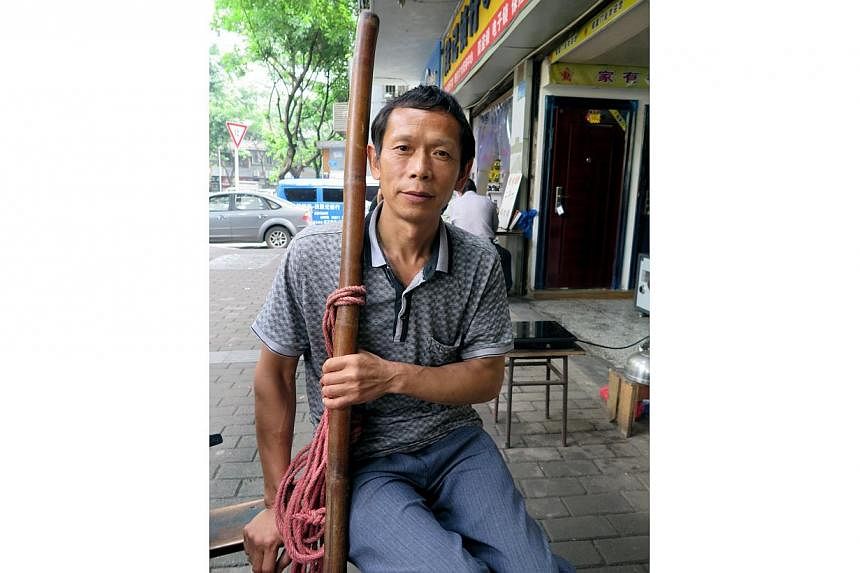Deep lines edge the tanned face of Mr Shu Xiaoping, a hint of the life as a farmer he left behind when he moved from a rural village to the city centre of Chongqing more than a decade ago.
A cigarette in hand and a sturdy bamboo pole in the other, the 50-year-old is one of the scrawny men known as "bang bang jun", or stick army in English, who eke out a living as porters balancing heavy goods on wooden poles in the sprawling metropolis of south-western China.
He was also one of the dozens of people I interviewed for a feature on China's urbanisation challenges that brought me to the three distinct cities of Jinjiang in southern Fujian province, Hefei in central Anhui province and Chongqing municipality.
Mr Shu left the deepest impression on me because it seemed like the country's rush to modernity would leave him behind despite Beijing's pledge to push a "people-centred" urbanisation as part of a new blueprint unveiled in March this year.
While he left his family behind in the early 2000s, drawn by the bright lights of Chongqing and its promise of a higher income and better life for them, his story tells of the darker side of China's top-down attempts to engineer millions more as urbanites instead.
Beijing believes that urbanisation will lead to a rising middle class that can in turn lift domestic consumption and provide a new engine to drive the country's slowing economic growth.
But as millions of farmers moved to cities across China, the urban infrastructure buckled under the strain of the growing population with local governments also lacking the funds to keep up the provision of social services for all.
The hukou system - a uniquely Chinese household registration system - also works against Mr Shu.
Even though he has been living and working for years in Chongqing's city centre, which has a population of about 7 million, his rural hukou disqualifies him from equal access to public services like healthcare and housing that his urban counterparts enjoy.
But his low educational background also disqualifies him further from some benefits meant for rural hukous holders.
He tells me, for instance, how he is unable to enjoy cheap rental housing as he cannot meet the scheme's educational qualification criteria.
But his nightmare does not end there.
Apart from this government-sanctioned discrimination, his job as a low-skilled labourer has also led to some of the city's locals openly despising him.
Staff at posh hotels, for instance, have been reported to turn violent on these porters for sullying their establishment's prestige if they ventured too close.
"But what can we do?" Mr Shu asks. "It is true that we are the people with the lowest status here so we just grit our teeth and bear it even though it makes us feel lousy inside," he told The Straits Times.
While his income averages just 3,000 yuan, or about S$600 a month, this is already more than the back-breaking work he would earn as a farmer back in his rural village in the outskirts of the municipality.
Part of Beijing's latest urbanisation plan, which had its finer details fleshed out last week, includes a bold move to grant city hukou to 100 million people by 2020. The classification of people as urban and rural will also cease and the growth of small cities will be encouraged instead.
On paper, this should have brought him some cheer. But with a staggering 245 million migrants, like Mr Shu, living like second-class citizens across China's cities, Beijing's 100 million target will likely leave him out cold.
This is because not only will the populations of big cities of more than 5 million be "strictly controlled", Mr Shu's low-educational level will likely put him at the back of the line.
A tough "points system", for instance, will be introduced to allow only the best and brightest Chinese citizens the chance to settle securely in big cities like Beijing, Shanghai and Chongqing.
And so even while China has earned itself bouquets for its hukou reform amid its ramped-up urbanisation drive, there remains much to be done - specifically making life better for the roughly 145 million who will not make it in time for the 2020 goal.
Less educated and poor, they are also the ones who will likely need the most help as they might continue being shunned by cities who would choose to offer their precious hukous to those better qualified instead.
Yet it is important that the government takes care of this less fortunate group so that they and their children believe that social mobility is within reach and can then break out of the cycle of poverty.
Educational policies, for one, should be made equal for migrant children regardless of the city's population, giving everyone an equal headstart.
Beijing's much lauded urbanisation plan should thus not be seen as the end but the beginning of a long journey.


